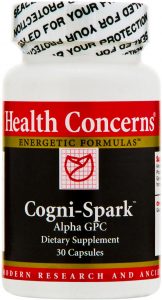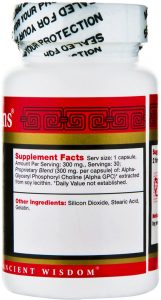CogniSpark and the Blood Brain Barrier
Posted by Patrick Postlewait on Oct 12, 2024
This month’s featured product is an effective but not as widely known supplement for cognitive function, memory, neurological health and more. It is popular among college students, athletes, and especially adults looking to protect cognitive function later in life.
Health Concerns’ CogniSpark contains Alpha GPC, a precursor to both phosphatidylcholine and acetylcholine that readily passes through the blood brain barrier to support the nervous and muscular systems.
Alpha GPC is a form of the nutrient choline, but what sets it apart from dietary and other supplement forms of choline? It may be one of the most effective forms of choline available, and might be useful even if your dietary intake of choline is adequate.
Here is a brief look into the importance of choline and what may set Alpha GPC apart ...
What is Choline?
Choline is a more recently discovered nutrient, only recognized as essential in 1998. The liver produces small quantities, but it must be taken in from the diet to avoid deficiency. It is not technically a vitamin or mineral, but is related to B Vitamins in structure and function in the body.
Importance of Choline
Choline serves many important roles in the body. It is required for healthy nervous system function, and is a precursor to the neurotransmitter acetylcholine, essential for cognitive function, alertness, focus and memory. In a related way, it is also required for muscular and neuromuscular function, most importantly including the heart.
Choline is also important as a building block in cell membranes and their integrity. It is also involved in the metabolism and transport of fats. Deficiency of choline can impact cholesterol levels and lead to the buildup of fat in the liver. 1
Dietary Sources of Choline
For adults, an average daily intake of 425 milligrams for women and 550 milligrams for men is recommended.1 The most plentiful food sources of choline include beef and chicken liver, eggs, cod, salmon, and soybeans. There are small amounts as well in many grains, legumes, greens, and other vegetables.
While deficiency is uncommon, certain groups need to be mindful of choline intake, including endurance athletes, people who frequently consume alcohol, pregnant and postmenopausal women, and those with malabsorption issues.
What is Alpha GPC Choline?
Alpha GPC Choline is short for L-Alpha glycerylphosphorylcholine, which is a naturally occurring compound in the brain. It is a precursor to the neurotransmitter acetylcholine, and it more easily and quickly passes through the blood brain barrier than other forms of choline. For this reason, researchers have been exploring its potential for cognitive health, including Alzheimer’s and other forms of age related cognitive decline.
As a supplement, it is commonly derived from lecithin, natural phospholipids either from soy or sunflower. It is mostly commonly derived from soy lecithin with a special enzyme process, as in CogniSpark.
Research on Alpha GPC Choline
Alpha GPC has shown significant benefits and promise in a number of areas of health research, in several studies both large and small.
- A large Italian study involving over 2000 patients who had suffered a recent stroke or ischemic attack were given Alpha GPC immediately following the event and for several months after. On follow-up, patients saw significant benefit on measures of mental state and general deterioration.There was also a very low incidence of mild side effects. Alpha GPC’s ability to protect cell membranes plays a major role in this benefit. 2
- In a placebo controlled trial with Alzheimer’s patients, Alpha GPC showed significant and continued improvement over a six month period and beyond, measured on multiple clinical scales for mental function. In contrast, placebo recipients showed no improvement or further deterioration during the same time period.3
- In animal studies with mice, Alpha GPC combined with ALA, DHA, Acetyl L-Carnitine, and Phosphatidylserine appeared to prevent or delay a model of age related cognitive decline. The combination reduced reactive oxygen species(free radicals) that cause cellular damage.4
- In a study comparing Alpha GPC to caffeine and placebo, Alpha GPC improved athletic performance, without the jitteriness of caffeine, in measures of speed, hand-eye coordination, and power, including vertical jump.5
- A controlled trial of healthy young adult males at 1200 mg daily improved attention and immediate memory recall.6
As always, more clinical research is required to further understand the extent of the potential benefits Alpha GPC may have for various health concerns, and at which dosages. At present, it appears to be safe and well tolerated taken in amounts much higher than typically recommended in Alpha GPC supplements on the market.
How to Use CogniSpark Alpha GPC
The recommended serving of CogniSpark is 1-2 capsules, twice daily between meals. Each capsule contains 300 mg of Alpha GPC. For best results, we recommend taking CogniSpark under the supervision of your health professional, as part of a comprehensive plan for your health.
References and further reading
- Brown, Mary Jane, PhD. ‘What is Choline?An Essential Nutrient With Many Benefits’. Dec 7, 2018. Published on the Web. https://www.healthline.com/nutrition/what-is-chol... Access Date 9/12/2019
- Sangiorio, Ballagorgo. ‘Alpha-Glycerylphosphocholine In The Mental Recovery of Cerebral Ischemic Attacks’. Ann NY Acad Sci. 1994 Jun 30; 717:253-69. https://www.ncbi.nlm.nih.gov/pubmed/8030842
- Moreno Moreno, De Jesus. ‘Cognitive Improvement in Mild to Moderate Alzheimer’s…’ Clin Ther. 2003 Jan;25(1):178-93 https://www.ncbi.nlm.nih.gov/pubmed/12637119
- Suchy, J. ‘Dietary Supplementation With a Combination of ALA, Acetyl-L Carnitine…’ Nutr Res. 2009 Jan 29(1):70-4 https://www.ncbi.nlm.nih.gov/pubmed/19185780
- Parker, Adam G. ‘The Effects of glycerylphosphorylcholine , caffeine or placebo on markers of mood, cognitive function, power, speed and agility’. J Int Soc Sports Nutr. 2015;12(Suppl 1):P41 https://www.ncbi.nlm.nih.gov/pmc/articles/PMC4595...
- Major, Christina. ‘Is Alpha GPC Really the Best Choline Source for Your Brain?’. Aug 28, 2017. https://www.developinghumanbrain.org/alpha-gpc-re... Access Date 9/12/2019













